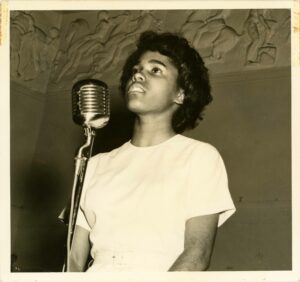Cheryl L. Evans Papers
A lifelong activist, performer, and educator, Cheryl Lorraine Evans was born in 1946 in west Medford, MA, the eldest of five. As a high school student, Evans attended the march on Washington in 1963, and was then the first in her family to attend college, in 1964 joining the largest class at UMass Amherst to date. She graduated four years later as a pivotal organizer of African American students across campus, the Five Colleges, and in the region – during the period when Black student groups, the Black Cultural Center, and the Black Studies department all had their origins at UMass. Evans was the first elected president of an African American student organization at UMass, and remains an organizer to this day, particularly as a key connector for Black alumni and through her UMass Black Pioneers Project.
Evans went on to work at UMass as an assistant area coordinator of Orchard Hill, an area housing the majority of the students of color and CCEBS students on campus at the time, and then for the Urban University Program at Rutgers University. She worked for over a decade in early childhood education, mostly in New Jersey and New York City, then while working for the State of Massachusetts received her MA in Communication from Emerson College, partially to help her public radio show, “Black Family Experience.” Evans was the first African American woman to run for City Council in Medford, and was appointed to the Massachusetts Area Planning Council by Governor Dukakis. She taught for five years at Northshore Community College, received her PhD from Old Dominion University in 1997, and ended her career at Bloomfield College, where she was a professor for 18 years until her retirement in 2016. A prolific singer as a child and young adult, Evans was, and continues to be, a performance artist, with several theater pieces focused on Black history, all in addition to her outreach, organizing, and workshops, many focused on increasing the number of Black graduate and doctoral students.
The Cheryl Evans Papers document over 60 years of the life of the educator and activist, including childhood report cards and essays, clippings from the civil rights movement she followed and joined as a high school student, undergraduate records and ephemera, documentation of Black UMass alumni events, and records from her careers in public advocacy, education, and the theater. Evan’s time at UMass is especially well documented, including schoolwork, numerous photographs of student life on campus, social and political organization records, including contact lists of and correspondence with Black students, and the original protest demands from the 1970 Mills House protest and march to Whitmore.

